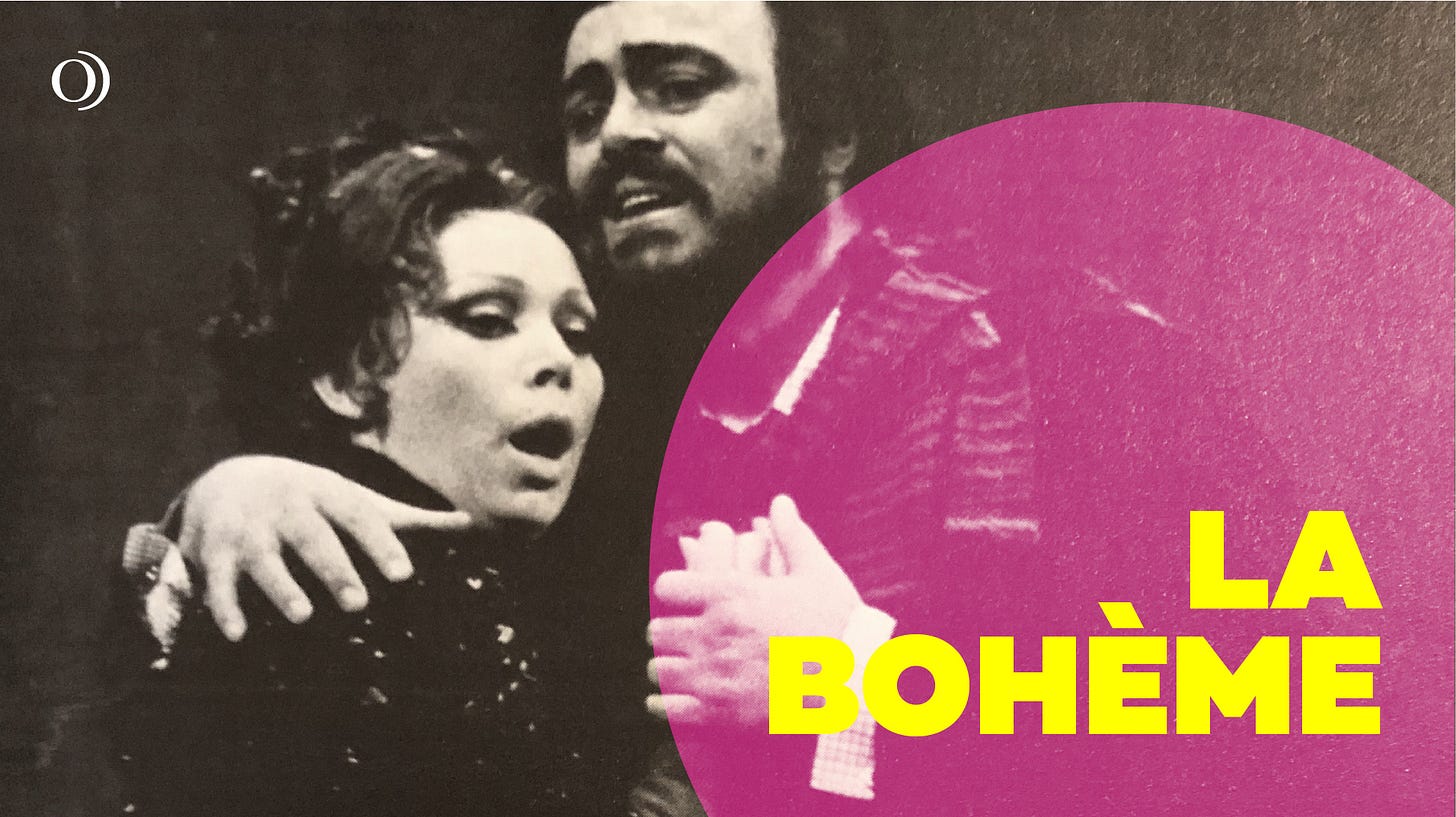Welcome to the Wednesday edition of Opera Daily, the best opera community on the internet.
Thank you to everyone who shared their interest and feedback with us on Listening Club. If you missed the post where we announced our new membership-based community launching January 15th, please take a look! The response to our launch post was incredible and so helpful as we shape this offering. On January 4th, we will be sharing what is included in the membership and allow you to to join officially. For now, though, we are just asking for you to communicate your interest and your preferences (with no commitment). It shouldn't take more than 45 seconds of your time.
This week is all about La Bohème.
It may have a sad ending, but La Bohème’s first two acts set on Christmas Eve felt like the perfect choice for this week.
Today we’re listening to selections from Act I of the Italian opera La Bohème by Giacomo Puccini. La Bohème was first performed in 1896 in Turin, Italy.
Rodolfo is a poet, sharing a small room in Paris with his friends Marcello, a painter; Schaunard, a musician; and Colline, a philosopher. They live in a cardboard box, with little to their names, but they are pursuing their art and are happy! On Christmas Eve, a girl named Mimì knocks on their door looking for a light for her candle (hers has blown out), as the group keeps warm by feeding their stove with pages from Rodolfo’s (row-DOLL-foe) latest poem. Mimì (mee-ME) and Rodolfo fall in love (not so fast this is opera, remember?), but soon it becomes clear that Mimì is sick. La Bohème is one of those great love stories that make us believe, no matter how predictable the outcome.
In Act I, Rodolfo introduces himself to Mimì in the aria “Che gelida manina”(“What a frozen little hand”). She responds with an aria of her own, “Mi chiamano Mimì (“Yes, they call me Mimi”), and then they sing of their newly found love in the duet “O soave fanciulla” (“Oh lovely girl”).
We are listening to Luciano Pavarotti sing the role of Rodolfo (tenor) and Mirella Freni sing the role of Mimì (soprano). If the first piece sounds familiar, “Che gelida manina” was the first aria we ever shared on Opera Daily. It felt appropriate to come back to the music that started it all on July 22nd when I was writing to a list of precisely zero subscribers! To think we are a group of over 4,000 today blows my mind, but more importantly, I am grateful to all of you beyond words. 🙏🏼
🎧 Listen here:
“Che gelida manina”
YouTube / Apple Music / Spotify
“Mi chiamano Mimì”
YouTube / Apple Music / Spotify
“O soave fanciulla”
YouTube / Apple Music / Spotify
It has been said that Puccini was inspired by his poor student days as he wrote this opera. He said, “I lived that Bohème...”
The plot is simple: The two couples fall (or have fallen) in love, out of love, and back in love again until, in the end, someone dies. Yes, it sounds simple(!), but Puccini, given the genius he is, can depict the characters’ personalities and their relationship dynamics in detail. While the opera has four acts, Puccini didn't call them “acts”. He thought of them as “images”.
Want more?
Giacomo Puccini (1858 - 1924) was one of the most famous Italian opera composers (after Verdi, of course!) He wrote 16 operas, most of which are still performed today, including Tosca, La Bohème, Madama Butterfly, and Turandot.
We hinted at the verismo period (Italian for “realism”, from vero, meaning "true") when we covered La Rondine, another Puccini opera. The term describes a style that became popular in the last decade of the 19th century. Puccini was probably the most prominent of the verismo composers. In contrast to the characters of earlier operas, in verismo Puccini is portraying everyday people in his works—like the artists of La Bohème. Puccini once said his success was due to putting “great sorrows in little souls”.
La Bohème has influenced everything from the Broadway musical Rent to The Simpsons. Jonathan Larson’s 1994 musical Rent is based directly on the opera, changing the setting from Paris to New York City, where a group of young artists struggle in the Lower East Side. Another aria from opera, Musetta’s Waltz was adapted for Bobby Worth’s 1959 R&B hit Don’t You Know, sung by Della Reese. The 1987 romantic comedy Moonstruck is filled with La Bohème references. And of course, Baz Luhrmann’s Moulin Rouge (which I feel compelled to mention, but not that compelled to include link 😉).
These new selections have been added to the playlist on YouTube.
🎁 The first 5 people* to click below and share their thoughts on Listening Club will get a free membership when we roll out in January!
*We will be contacting this group of 5 as well as the initial 15 memberships we gave away in our launch post before January 4th. Reminder, the number of memberships for our January 15th launch will be capped at 1500.
Happy Holidays!
Thank you again for listening and coming along on this journey so far,
Michele
❤️ If you enjoyed this selection, hit the heart to like it. It helps others find Opera Daily.






Carlos Kleiber: La Boheme (Puccini) La Scala 1979 ...
https://www.youtube.com/watch?v=76o5q4zhjRk
Carlos Kleiber: La Boheme (Puccini) La Scala 1979 ...
3:34:43
Dec 05, 2016 · Click here to enjoy more videos: http://cinematag.com http://documentary.googleusd.com Milan , La Scala 30 March , 1979 ; Live Recordings La Scala Milan Orch...
While at LaScala I appeared in BOHEME. Kleiber was the astounding conductor with Pavarotti and Freni in this legendary performance. You might catch a glimpse of me in Act 2 on the upper stage deck as a pedestrian in 1979.
Great!